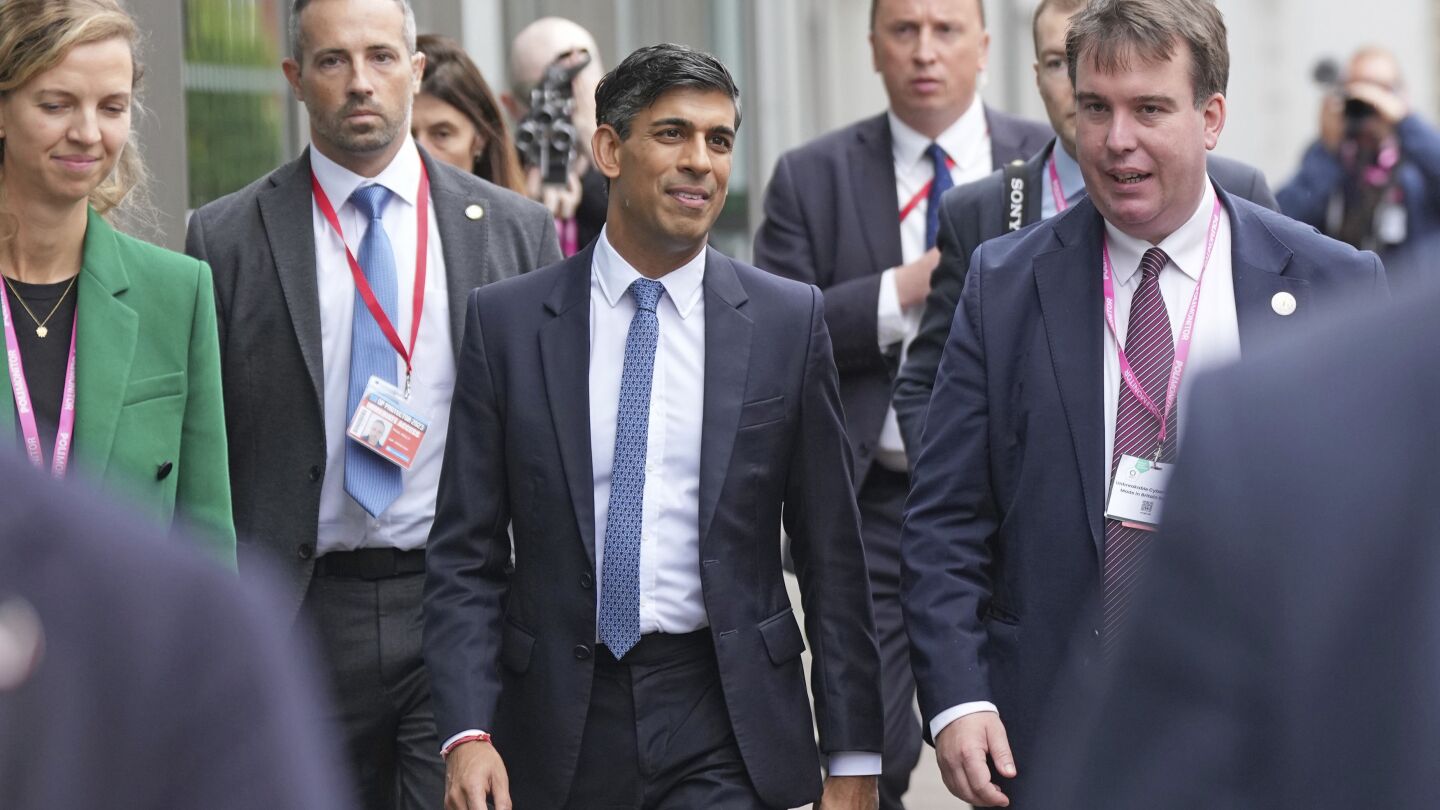MANCHESTER, England (AP) — British Prime Minister Rishi Sunak will be out of a job next year unless he can persuade his Conservative party and his country that he represents change.
Sunak makes his first — and possibly last — speech as leader to the party’s annual conference on Wednesday, with the governing Conservatives trailing in opinion polls and an election due in 2024.
His message: He’s not afraid to make tough choices and big decisions that will deliver “long-term success” rather than “short-term advantage.”
But he’s struggling to set the agenda and one of his big decisions has already overshadowed the conference and split the party. News has leaked that he plans to scrap much of an ambitious but overbudget high-speed railway line that was planned to link London and Manchester.
Some Conservatives think that’s a bad move — and doing it at a conference in Manchester is disastrous.
Andy Street, the Conservative mayor of the West Midlands region, called it “an incredible political gaffe” that would leave the party’s opponents saying “the Tories have come to Manchester to shaft the North.”
The embattled High Speed 2 railway, once billed as Europe’s largest infrastructure project, was meant to slash journey times and increase capacity between London, the central England city of Birmingham and the northern cities of Manchester and Leeds with 250 mph (400 kph) state-of-the-art trains.
Depicted as a key part of the government’s plans to “level up” the country by redistributing jobs and investment from the affluent south of England to the poorer north, its cost was estimated at 33 billion pounds in 2011 but has soared to more than 100 billion pounds ($122 billion) by some estimates. The Manchester-Leeds leg was lopped off by the Conservative government in 2021, after the coronavirus pandemic brought train travel to a halt. U.K. passenger numbers have recovered, but are only about 80% of pre-pandemic levels.
Sunak looks likely to try and cut the project’s losses by ending it at Birmingham, 100 miles (160 kilometers) from London, rather than farther north in Manchester.
Manchester Mayor Andy Burnham, a member of the opposition Labour Party, said the decision sends the message that “we can’t do big and difficult things anymore, and I don’t think it reflects well on Britain.”
“I just don’t think it’s fair to people in Greater Manchester to do this,” he said.
Axing the rail line has some supporters. Jack Brereton, a Conservative lawmaker from the Midlands, said HS2 is vastly overbudget and has already been cut back so much that it will do little to help the north. He welcomed the move to truncate it, saying “we can reinvest that money in schemes that actually will deliver that levelling up in the Midlands and the North.”
Sunak is trying to persuade the voting public that a party in power for 13 years deserves another term in office. In recent weeks he’s announced populist measures — such as slowing moves to phase out fossil fuels — designed to win back voters who have rejected the Conservatives over Britain’s stagnating economy, cost-of-living crisis and waves of strikes, including one Wednesday by train drivers that upended some conference participants’ travel plans.
Like many Conservatives, he’s invoking the spirit of former Prime Minister Margaret Thatcher, whose free-market policies transformed Britain in the 1980s, at a high cost to working-class communities. Sunak suggested he was Thatcher’s political heir — and not the five other Conservative prime ministers since.
“We’ve had 30 years of a political system which incentivizes the easy decision, not the right one – 30 years of vested interests standing in the way of change,” Sunak plans to say, according to his office.
Sunak took office just under a year ago after his predecessor Liz Truss alarmed financial markets and roiled the economy with a plan for unfunded tax cuts. She lasted just 49 days in power.
Before that, Sunak was Treasury chief to Prime Minister Boris Johnson, who resigned amid multiple ethics scandals.
Opinion polls suggest voters are weary of the Conservatives and their turmoil, putting the left-of-center opposition Labour Party 15 to 20 points ahead.
Sunak’s rivals are already jostling for position on a party leadership contest that could follow election defeat. Home Secretary Suella Braverman used her conference speech to appeal to the party’s authoritarian, law-and-order wing, advocating tougher curbs on migration and a war on human rights protections and “woke” social values.
The conference mood was subdued — “There’s no oomph” lamented one delegate, as many in the party contemplate the possibility of losing power.
Sunak plans to acknowledge that people feel “an exhaustion with politics” and “there is the undeniable sense that politics just doesn’t work the way it should.”
“Our political system is too focused on short-term advantage, not long-term success,” he’ll say. “Politicians spent more time campaigning for change than actually delivering it. Our mission is to fundamentally change our country. ”

